Jul 22, 2025. Venerable Pomnyun Sunim’s Invited Lecture at Navy Headquarters, Happy Dialogue (2) Daejeon
Hello. Today, Sunim was scheduled to attend an invited lecture hosted by the Navy Headquarters at Gyeryongdae for a Dharma Q&A session, and to give a Happy Dialogue Dharma Q&A lecture for Daejeon citizens at the KAIST auditorium.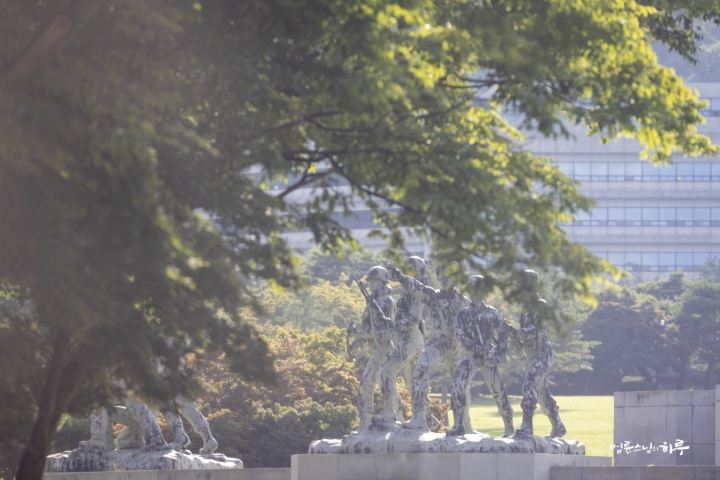
After completing his morning practice and meditation, Sunim headed to the Peace Foundation. He began his day at 9 AM with a meeting with foreign affairs and security experts.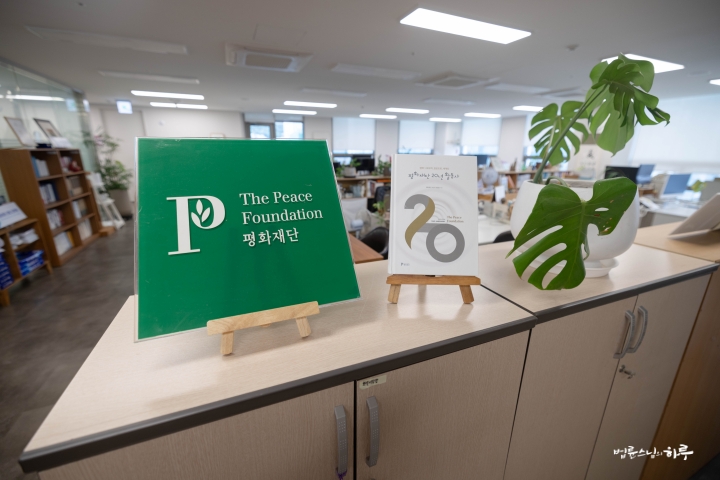
An in-depth discussion ensued about how to resolve North Korea-US relations as a solution for peace on the Korean Peninsula, and what role the newly inaugurated Korean government should play. The experts presented various perspectives on President Trump’s future approach to North Korea and exchanged opinions on Korea’s diplomatic and security strategies to turn this opportunity into a turning point for establishing peace on the Korean Peninsula. After about two hours of lively dialogue, the meeting concluded with coordination of the next gathering schedule.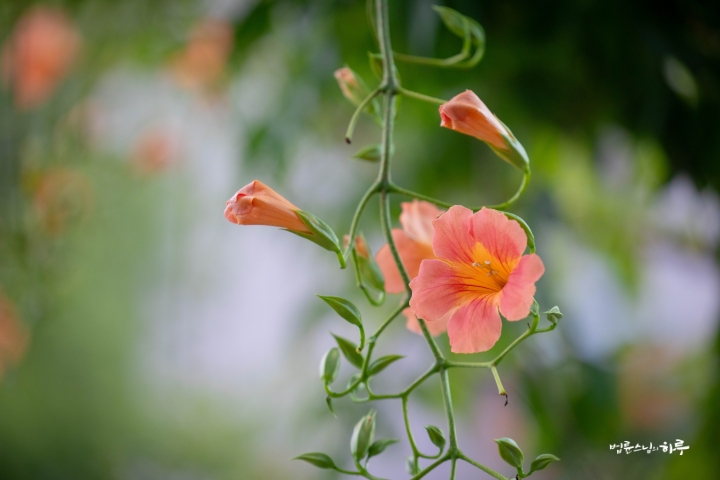
After having lunch in the basement dining hall, Nima from Bhutan visited Korea and came to pay her respects to Sunim. Nima is the younger sister of Rinchen Dawa, who provides interpretation services and accommodation whenever Sunim visits Bhutan.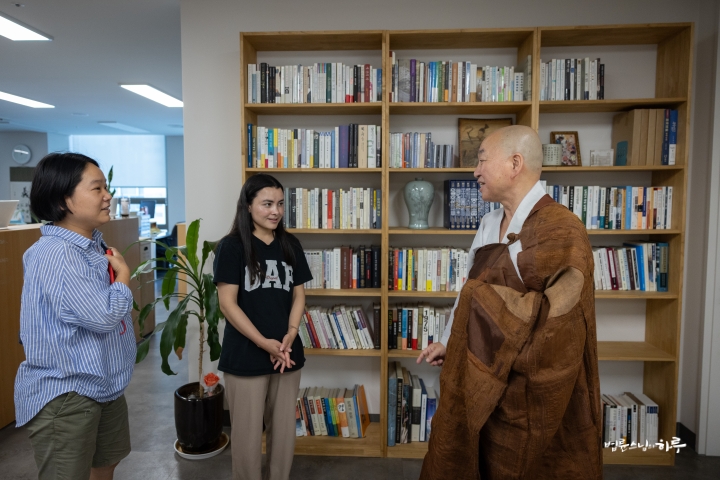
“When did you come to Korea?”
“I came a week ago, and I’m returning to Bhutan tomorrow.”
“I see. I’ll give you some pocket money, so have something delicious today and have a safe trip back to Bhutan.” 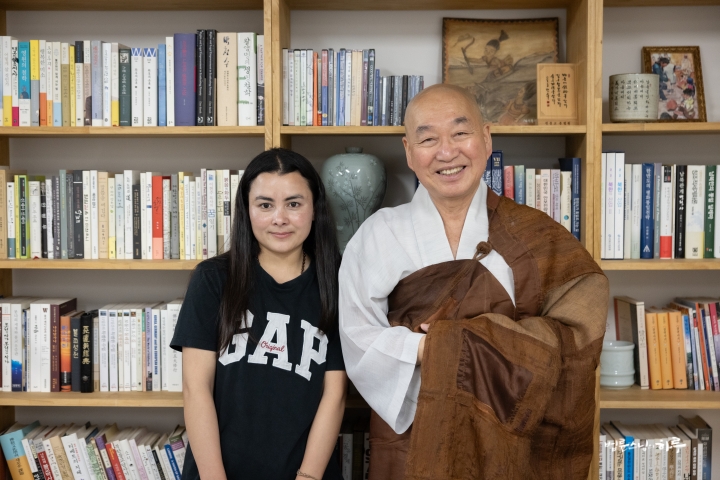
After exchanging warm greetings, Sunim departed from the Seoul Jungto Social and Cultural Center at noon and headed to Gyeryongdae.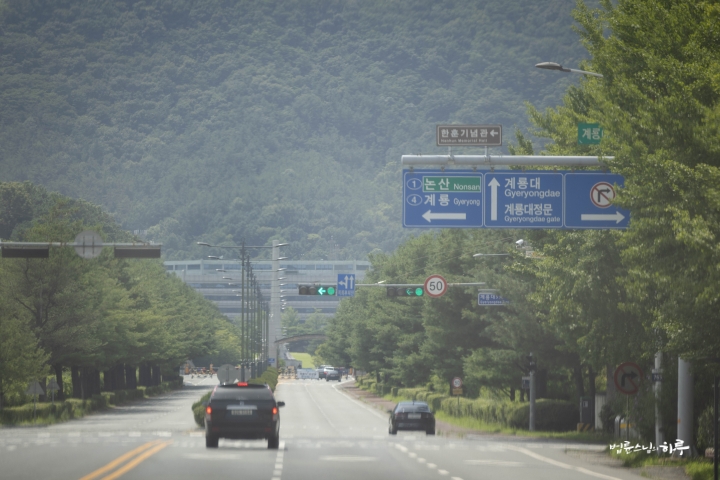
At Gyeryongdae, where the headquarters of the Republic of Korea Army, Navy, and Air Force are located, Sunim was invited by the Navy Headquarters to give a Dharma Q&A lecture. The Chief of Naval Operations and other military generals had been very enthusiastic in preparing for the lecture, even reading Sunim’s books in advance.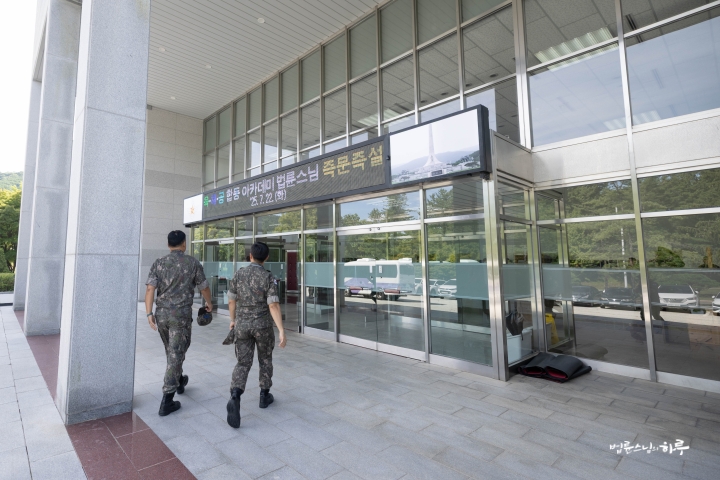
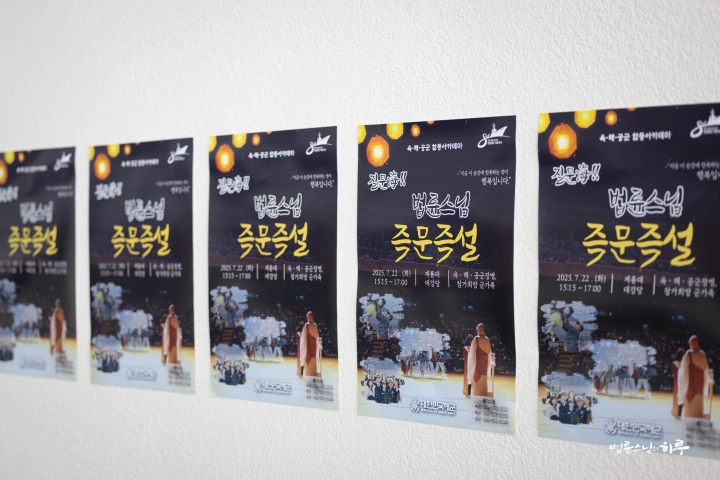
At 2:50 PM, Sunim arrived at the main building of Gyeryongdae where the Navy Headquarters is located. Although the Navy Headquarters hosted the event, all three services decided to participate since their headquarters are located in the same place. Before the lecture, Sunim moved to the reception room to have a conversation with the leadership of the Army, Navy, and Air Force.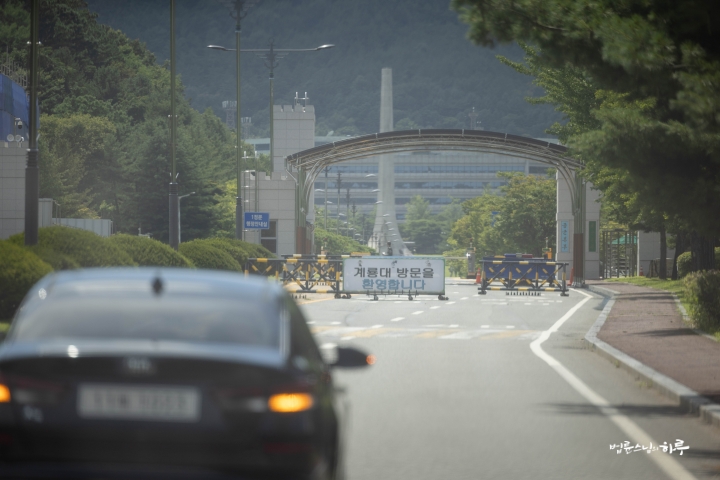
Leaders from all three services were present, including Chief of Naval Operations Yang Yong-mo.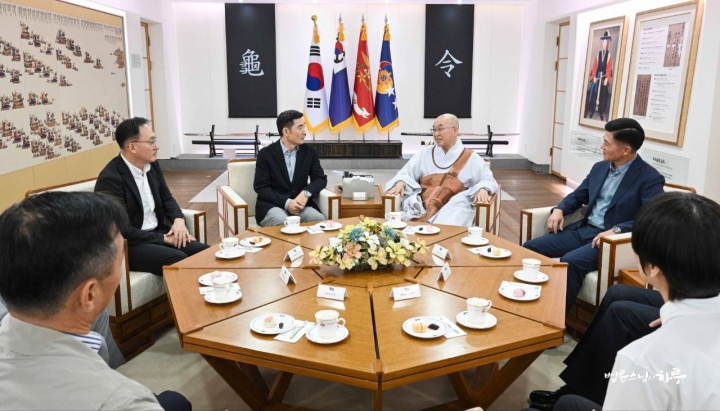
After finishing the conversation with the military generals, the Chief of Naval Operations presented Sunim with a commemorative plaque.
“Thank you.” 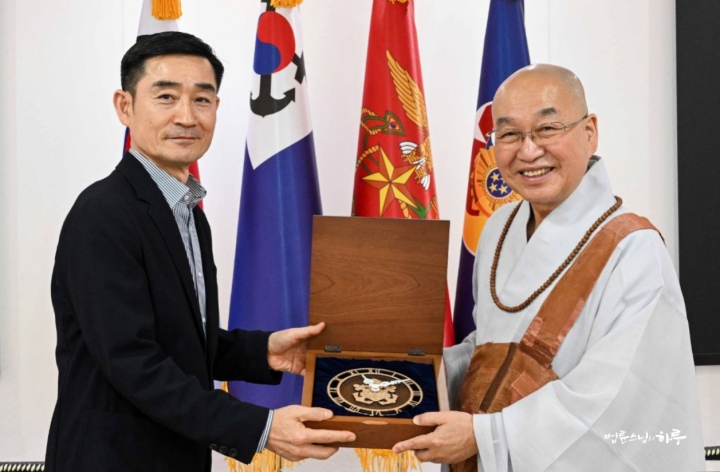
After expressing his gratitude, they moved together to the auditorium for the lecture.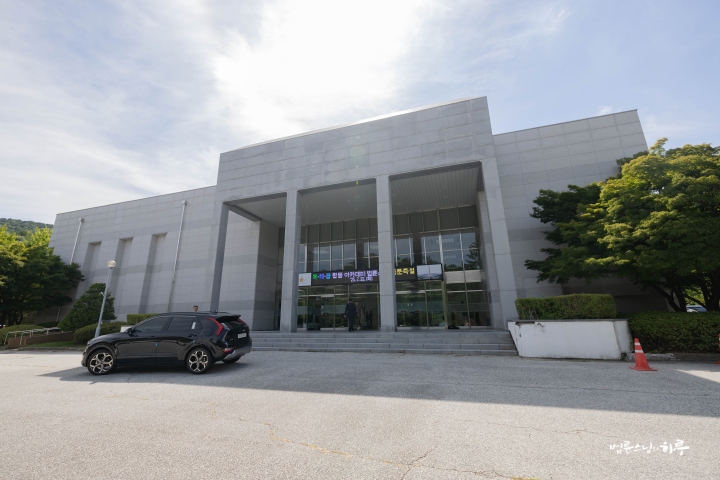
About 680 officers from the Army, Navy, and Air Force filled the venue. When Sunim appeared, thunderous cheers and applause erupted.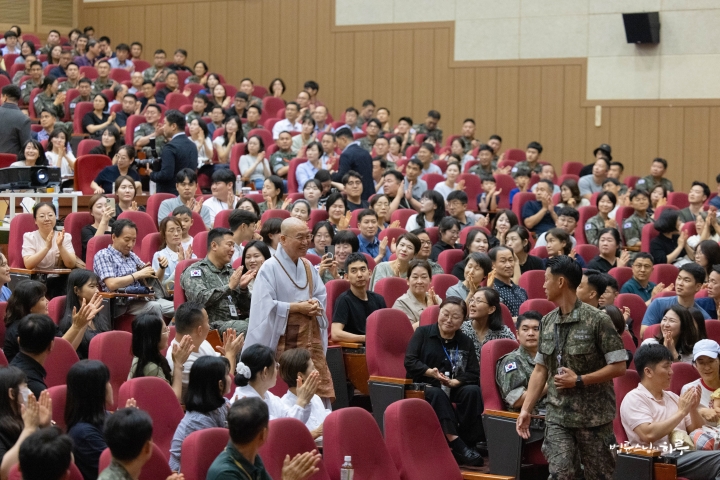
After the host introduced Sunim, he walked onto the stage and took his seat. Sunim first explained what a Dharma Q&A session is.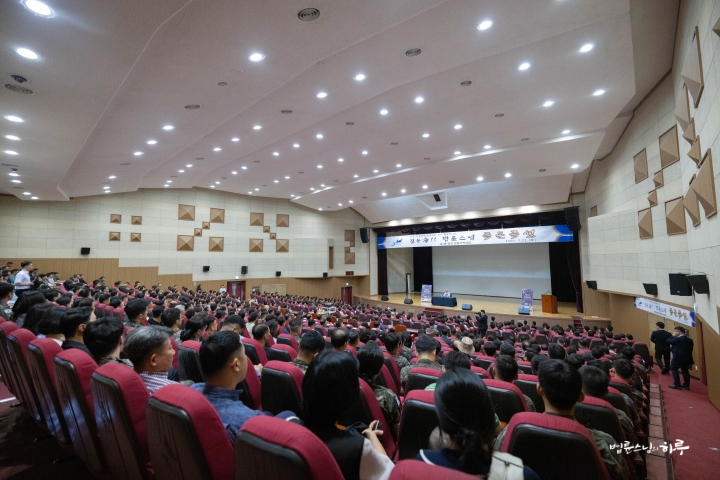
“Thank you all for your hard work protecting our country in this hot weather. Today, I’d like you to set aside your professional roles and responsibilities for a moment and have a comfortable conversation, as if we’re friends meeting at a café. Feel free to open up and say things like ‘I have this difficulty.’ The challenges of workplace life aren’t necessarily just problems of that workplace. Ultimately, it’s about the suffering I feel in that environment. So I’d like to discuss with you from the perspective of ‘What mindset can we have in that environment to live more freely and peacefully?’ Please feel free to speak without any special preparation. 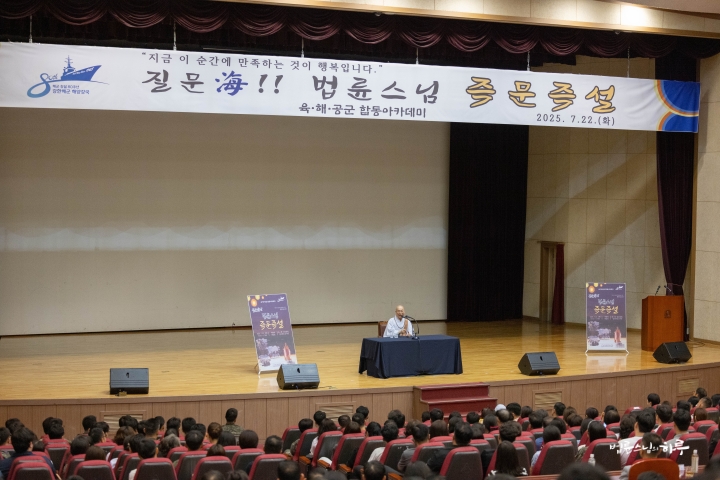
Why Do We Suffer When We Live as We Please?
If someone asks me, ‘How should I live my life?’ I would say, ‘Live as you please.’ It might sound irresponsible, but I would say the same thing even if a squirrel or rabbit asked. There’s no predetermined way to live life. You just need to live as you please. But if you’re suffering even though you’re living as you please, there’s a contradiction somewhere.
Why do we suffer when we’re living as we please? It’s because it’s foolish, so we need to examine the reason. Once you realize ‘Oh, this is why I was suffering,’ you can live without suffering anymore. Rather than suffering when something happens, if you just examine why, you can find solutions more easily than you think. Now, let’s begin our dialogue. Anyone who has a question, please raise your hand.”
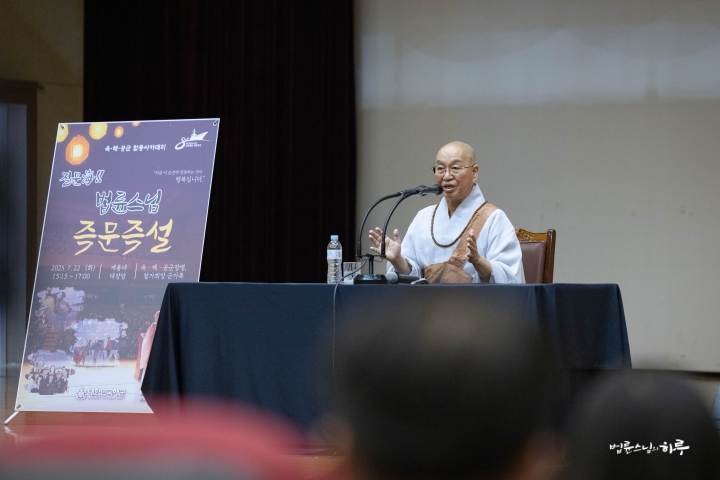
Next, there was a time for anyone to raise their hand and ask questions about the difficulties they face in life. The military officers candidly shared their life conflicts and concerns experienced in the unique environment of the military. Over the course of two hours, nine people had conversations with Sunim.
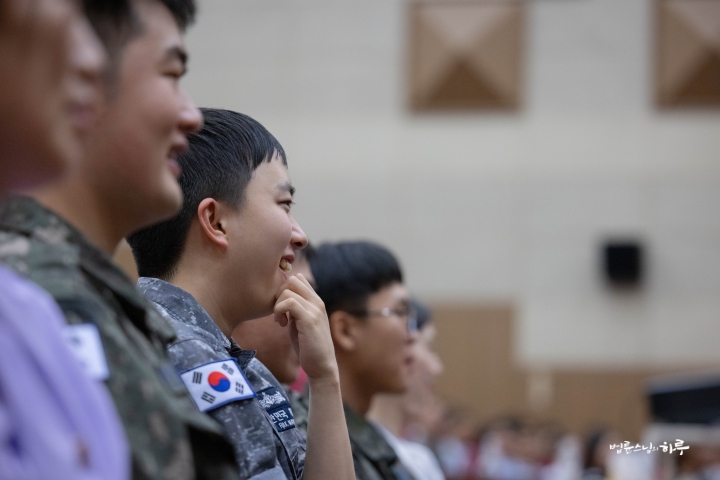
The first questioner asked Sunim when he might meet a good person, saying it was difficult to date in military life with frequent relocations. Laughter erupted from various parts of the audience. Sunim answered with a smile.
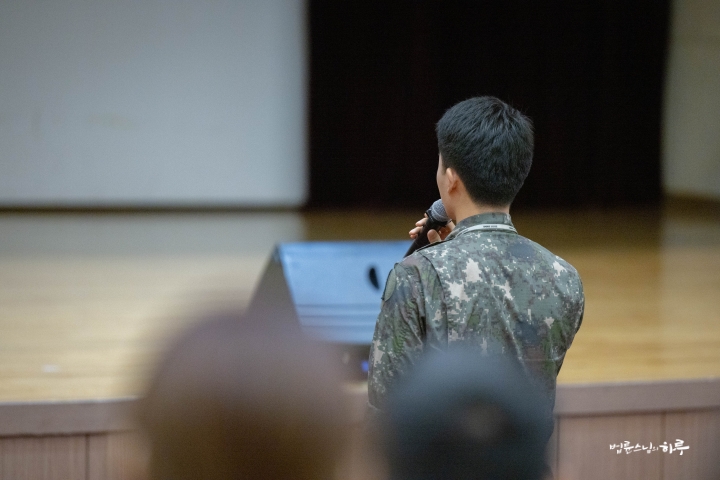
I’m Getting Lonelier and Lonelier. When Will I Meet a Good Person?
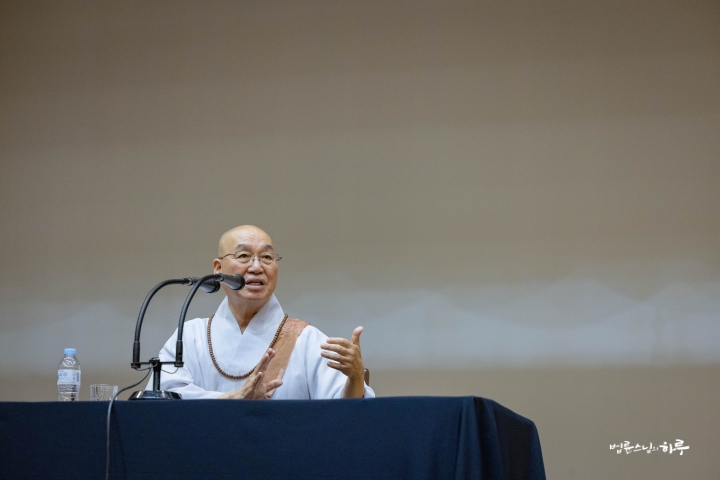
“Seeing that you’re looking for a good person, it seems like it might be a bit difficult for you to get married. If you want to get married, you shouldn’t look for someone too good. You need to broaden your range of choices. For example, ‘As long as he’s a man or ‘As long as she’s a woman,’ or ‘An age difference of up to twenty years either way is fine.’ You need to have at least this level of flexibility to find someone compatible. Many people say, ‘I don’t care about conditions,’ but when you actually ask them, all sorts of conditions come out. They want someone only one or two years older, a certain height, certain looks, a certain personality – because they consider so many conditions, they can’t get married. On top of that, I have to like the person, and that person has to like me too. If you input these conditions into a computer and ask, ‘How many people like this are there?’ it would probably say there’s no such person.
Most people who are already married actually got married by being deceived. They were deceived by a made-up face, by high heels, or in some cases, marriages happened because matchmakers lied about educational backgrounds. Even people who dated and got married often complain after marriage that they feel ‘deceived.’ But actually, it’s because they were deceived that the marriage happened. People tend to look slightly above their level. But since the other person is also looking up, I’m not easily visible to them. To catch that person’s eye, I need to slightly elevate myself too. But if you only look for good people trying not to be deceived like you, marriage becomes difficult. There’s no objective existence called a ‘good person.’ If I like someone, that person becomes a good person. However, the probability of meeting such a person is less than one or two out of ten. Since I have to like that person and that person has to like me too, it’s not easy to find even one in a hundred. 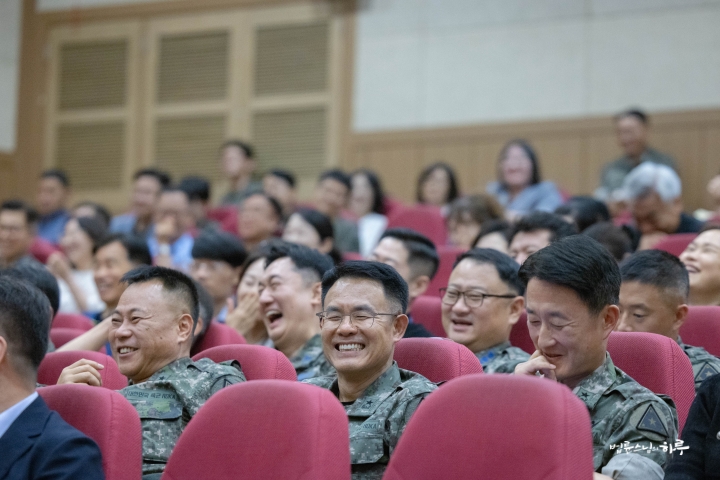
Dating is simple – two people just need to like each other. Age differences are fine, and it doesn’t matter if they’re foreign. But marriage is different. It’s not just about the couple being happy. Parents need to approve, family members all have something to say, and the same goes for the other family. Dating is between two people, but marriage is a family matter. That’s why there’s so much interference from others about whether to accept someone as part of the family. This complexity makes marriage seem difficult, but in reality, everyone gets married with a bit of deception. As a result, conflicts are inevitable in married life. However, if you realize that you were able to get married because of that little deception, it’s not a big problem.
Still, the risks have decreased compared to the past. In the old days, you could only marry once, and sometimes you’d marry without even seeing the person’s face. That’s why people had to check compatibility using birth dates and scrutinize family backgrounds. But things are very different now. You can meet the person, even live together, and then decide to marry if it feels right. The risks have decreased that much. If it doesn’t work out, you can end it and start over. So there’s no need to hesitate too much.
In the past, people were extremely careful because they could only marry once, but now you can check the conditions, get married if it seems okay, and end it if it doesn’t work out. These days, the problem is that people are too picky and calculating before marriage, so their expectations are too high. When they actually live together, they often break up because they don’t match well. Whether you carefully select one person out of ten and then break up, or hold hands with someone on the street and live together before breaking up, the result is the same.”
“I’ve lowered my standards a lot too – ten years older or younger is fine, and I just want someone who’s affectionate.”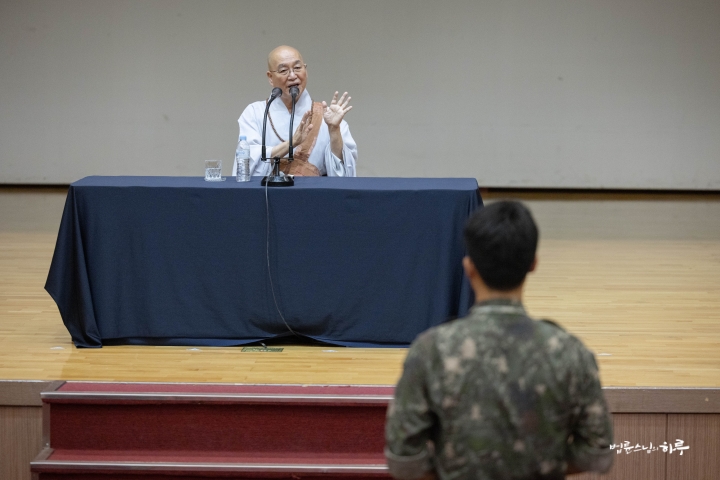
“Affectionate people are nice to be with, but they often lack backbone. You need to know that. Someone soft as cotton may be gentle, but when you live with them, they lack firmness. On the other hand, someone hard as steel keeps clashing with you. Every personality trait has both advantages and disadvantages. If you like softness, you must accept the weaknesses that come with it. If a large age gap feels good, you must also endure the difficulties that come with that difference. Every condition has two sides. If you choose this, you must give up that; if you want that, you must accept this. Choice always comes with responsibility.
So when choosing something, you need an attitude that accepts the opposite side as well. When you develop such inclusiveness, while others might quit after 3 years, you can last 5 years; while others quit after 10 years, you can live together for 20 years. Rather than setting a firm goal like ‘I’ll never break up!’, it’s better to have a lighter mindset of just maintaining a slightly better than average relationship.
But I don’t think you grabbed the microphone today because you wanted to ask me something. It seems like you actually wanted to make a public announcement: ‘I’d like to date someone – is there anyone around?'” (laughter) 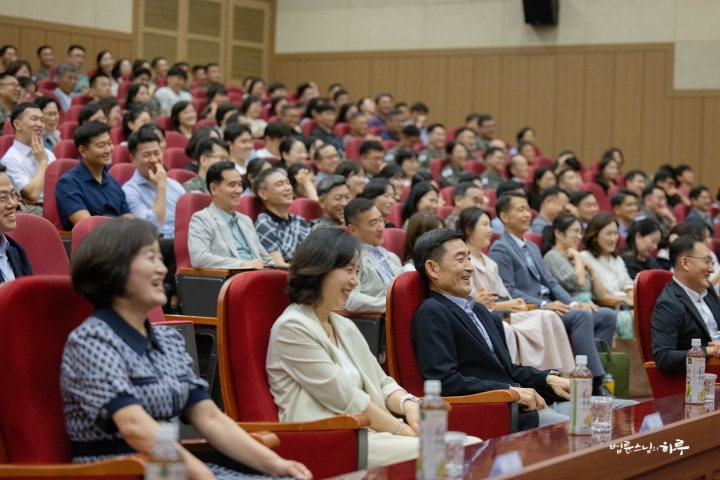
The next questioner sought Sunim’s advice on how to practice filial piety in a balanced way when he wants to care for his parents directly after retirement but faces conflict with his wife.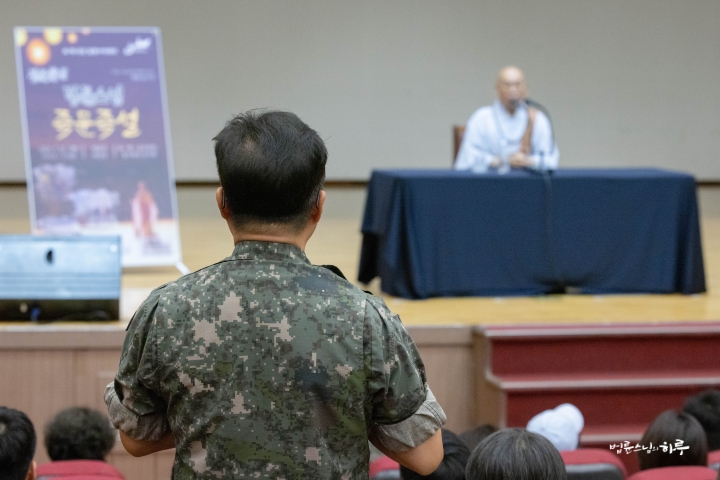
I Want to Stay Close to My Parents After Discharge, but How Can I Persuade My Wife Who Opposes It?
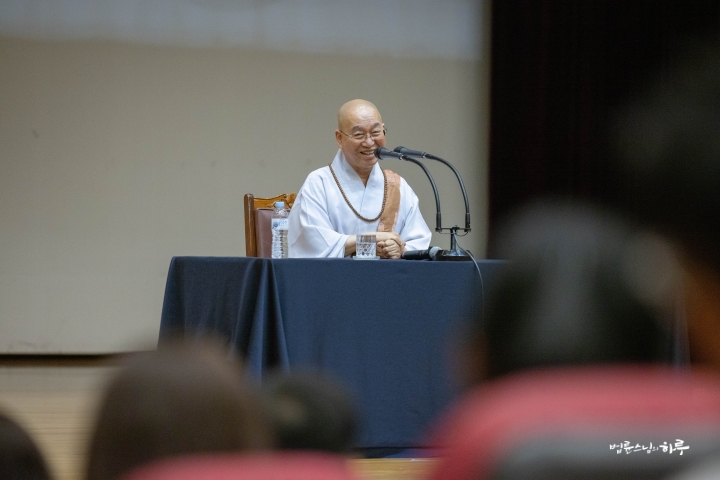
“Just do what your wife suggests. I fully understand your desire to care for your ailing parents. However, that desire isn’t really about helping your parents—it’s just your need to repay the debt accumulated in your heart. Even if you go to your parents, it’s uncertain whether it will truly help them.
Living with your parents is also something that requires deep consideration. Think about it. Your wife is someone you’ll need to live with for more than 30 years. On the other hand, you might only have about 10 years left with your parents. How can you live by turning your back on your wife, with whom you’ll spend 30 years, for the sake of parents with whom you might only have 10 years? Listen to your wife’s opinion, and within that framework, suggest two possible alternatives. First, rather than making promises like ‘I’ll take responsibility,’ spend time caring for your parents occasionally. When you actually try caregiving, you’ll quickly realize it doesn’t go as planned. So visit once a week or drop by frequently when you have time. Second, if your siblings or other family members provide care, you can support them financially. That way, you can gradually coordinate with your wife.
If you forcefully reach an agreement with your wife to live with your parents for about a year, it goes against the principle of marriage. Marriage means leaving your parents’ care to build a new family. If you keep clinging to your old family and causing conflict in your current family, that’s not wise. While I fully understand your feelings, it’s not a wise attitude. Wouldn’t it be wiser to visit your parents frequently within limits your wife can accept and check on them by phone?”
“Thank you.”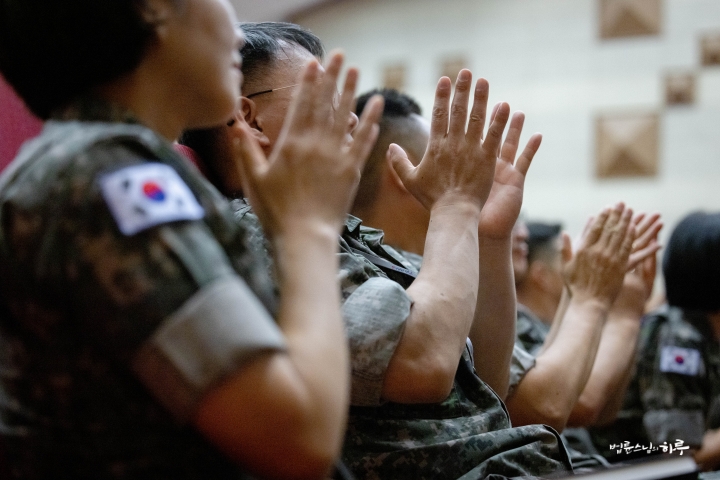
Questions continued to come in.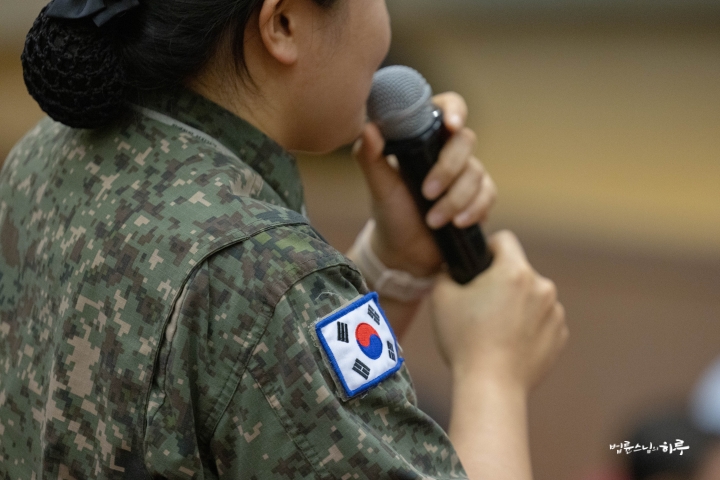
I’ve given up my career following my husband through more than 10 relocations, but he’s being uncooperative about a hard-won overseas work opportunity I recently received. With what mindset should I make my choice?
Is it the right path to continue practice and dedication while trusting myself when I feel weak and foolish?
Was choosing to be a weekend couple for my child’s education and settlement the right decision?
Due to my special situation as a soldier, I can’t meet my girlfriend often, and she demands that I adjust more to her schedule, causing conflict. What should I do?
I’m about to get married, but my wife is introverted and family-oriented, so I have to give up my hobbies. How should I accept and coordinate these differences?
I’m secretly preparing for a professional exam, choosing a career path different from my parents’ expectations. How can I persuade my parents without conflict if I fail or continue to pursue it?
I want to live with positive influence in my workplace and social life. What attitudes and practices are needed to have a good influence on others amid busy work?
Although more people wanted to ask questions, it was time to conclude. Finally, Sunim offered words of comfort and encouragement to military officers who had been emotionally wounded by the recent martial law situation.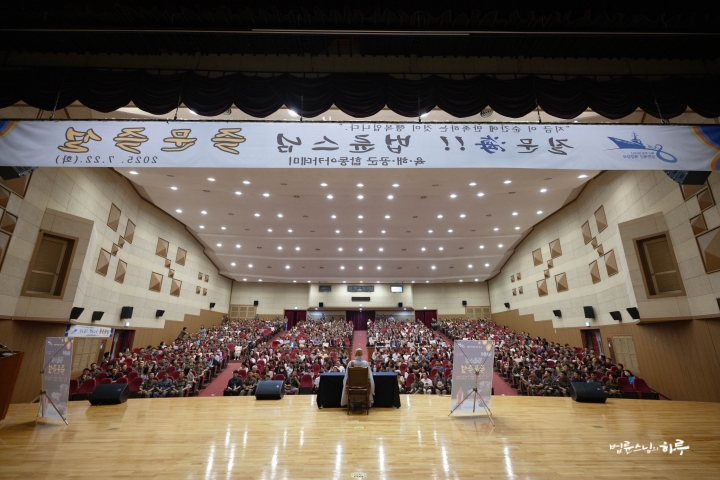
“Military personnel, you’ve had a difficult time this past winter, haven’t you? I won’t go into specifics. What happened last winter was something that could wound your pride as soldiers. However, even though such an unfortunate incident occurred, what we really need to focus on now is protecting the lives and property of our citizens. Of course, issues like the climate crisis and trade tariffs are important. But a far more critical task is ‘preventing war.'”
Strong Defense and the Path to Peace Must Go Together
“How much the economy has grown, what influence Korean culture has on the world, and how mature our democracy has become are all important, but if war breaks out on this land, all the achievements we’ve built over the past 70 years could collapse in an instant. Japan has little possibility of sudden war breaking out. But we are different. We still live under conditions where war could break out at any time. Because the war hasn’t ended—we’re in a ceasefire. That’s why we must be clear about the perspective that ‘war must never happen again on this land’ under any circumstances. 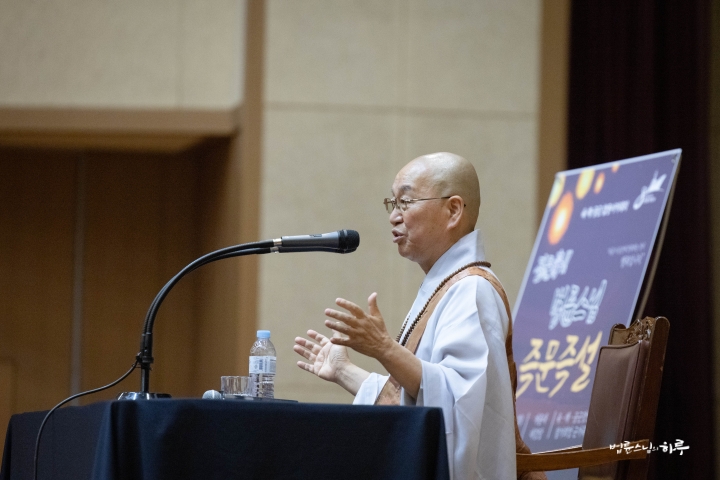
Thoughts like ‘We could try war just once’ or ‘Wouldn’t it be fine if we win the war?’ are truly dangerous. War must never happen. But preventing war isn’t something that can be resolved just because we don’t want it. Even if we don’t want it, the other side might attack, so we must have solid defensive capabilities. To deter the other side’s provocations, strong defense must be backed up. At the same time, we must reduce conflicts and ease tensions so the other side doesn’t want to start a war. Therefore, continuing dialogue between North and South Korea and maintaining strong defensive capabilities are not contradictory at all. To preserve peace, these two things must go hand in hand.” 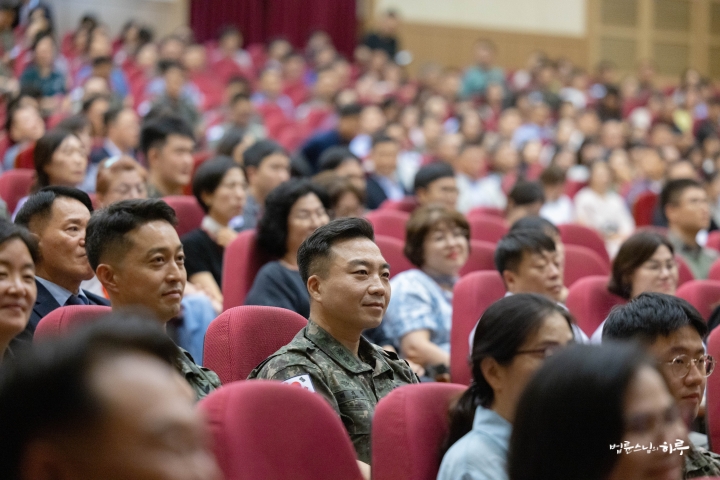
When It’s Time to Protect Peace with Military Pride
“From this perspective, you are currently playing a very important role in protecting the security of the Republic of Korea. Whether the world recognizes it or not, this responsibility is by no means light. I sincerely hope that your wounded hearts will heal quickly through this incident.
I’ve heard that many of you are considering early retirement these days. I hope you won’t do that. Please take pride in protecting our country and safeguarding the lives and property of our citizens. For the Republic of Korea to continue growing and developing, your dedication and hard work are absolutely necessary. The reason I came here today is specifically to help with your psychological stability. If internal conflicts deepen, cracks can appear in our defense posture. I hope all of you will fulfill your roles with a more peaceful mind and sense of mission.”
The joint Army, Navy, and Air Force lecture with Venerable Pomnyun Sunim concluded with loud applause.
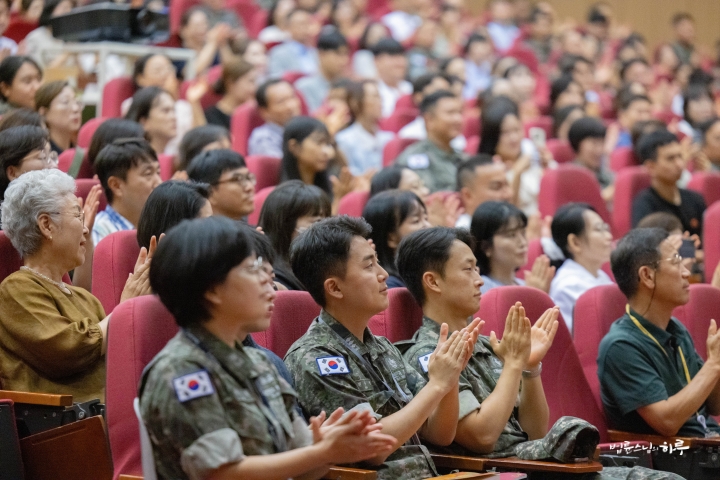
Those who brought Sunim’s books received autographs from him on stage.
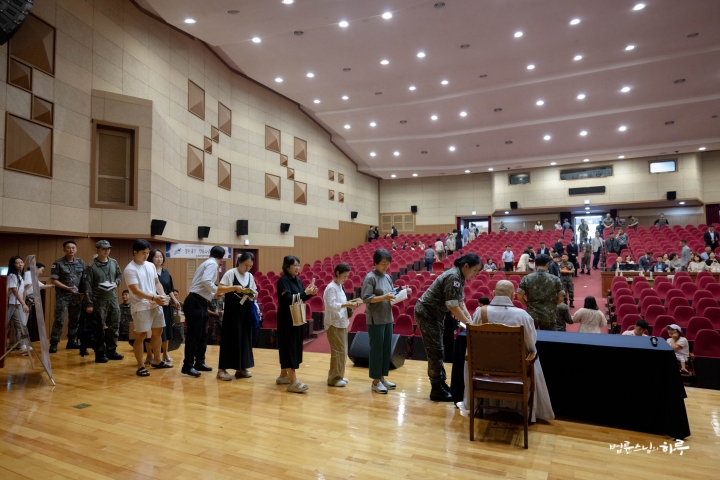
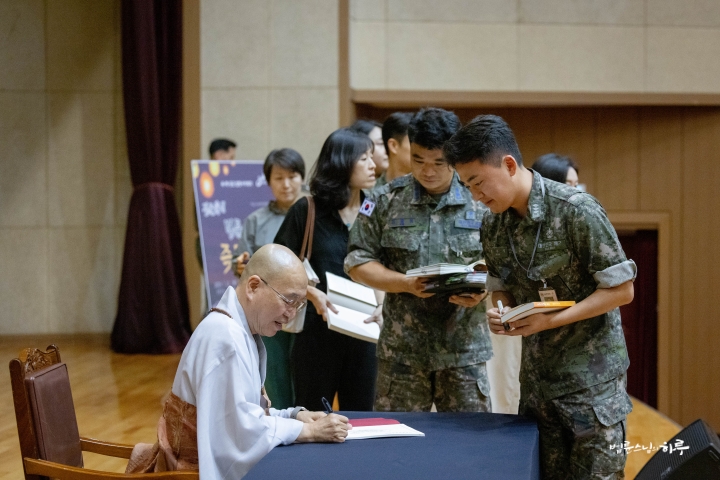
The Chief of Naval Operations personally saw Sunim off until he got into his car.
“Sunim, thank you so much for your wonderful words today.”
“If you arrange such gatherings once or twice a year, I’ll gladly come.”
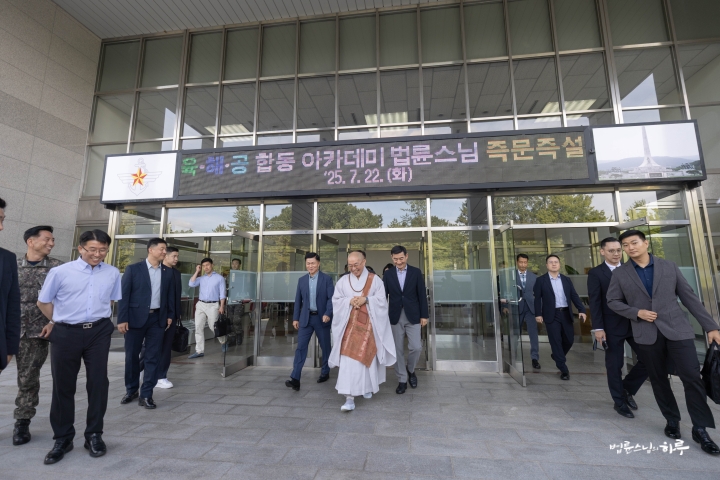
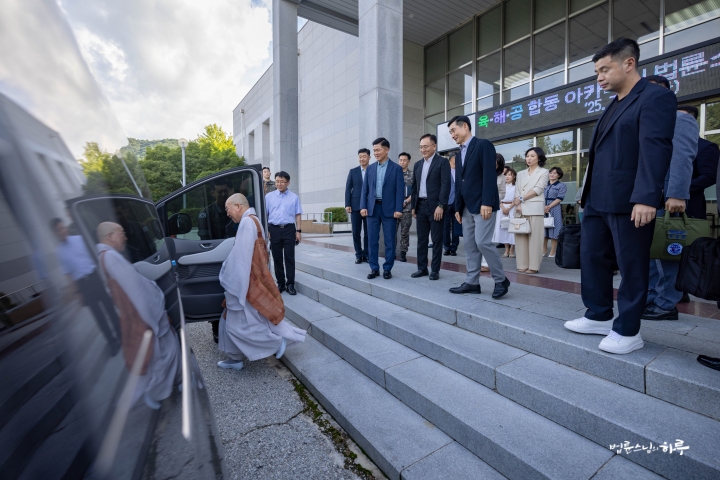
At 5:10 PM, Sunim departed from Gyeryongdae headquarters and headed to KAIST in Daejeon.

Following the first 2025 Happy Dialogue lecture held at the Jungto Social and Cultural Center in Seoul on the 27th of last month, today marked the second lecture for Daejeon citizens at the KAIST auditorium.
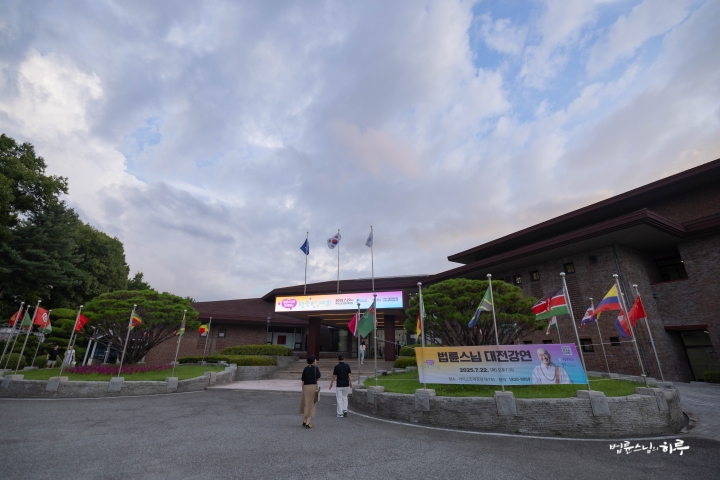
When Sunim arrived at the KAIST auditorium, volunteers and Daejeon citizens welcomed him with enthusiastic cheers.
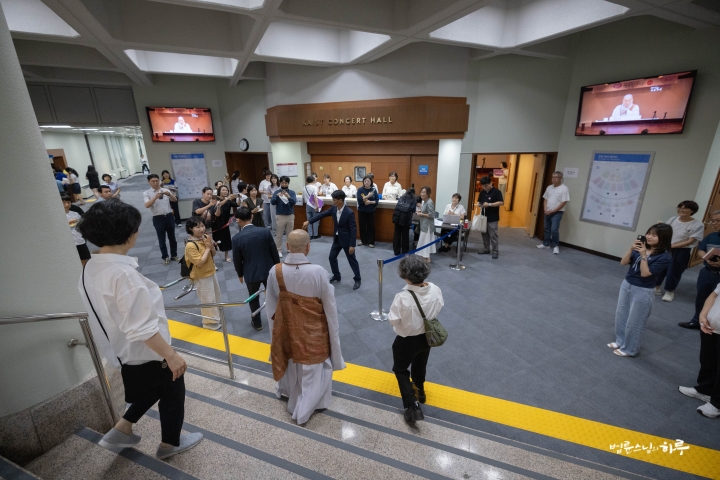
Today’s lecture was jointly hosted by Happy Citizens of the Daejeon-Chungcheong region and the KAIST Technology Management Innovation Center. KAIST professors Jo Hang-jeong and Kwon Oh-jun, who are also Jungto Society members, along with Professor Kim Se-jeong from Chungnam National University, were waiting in the waiting room to greet Sunim.
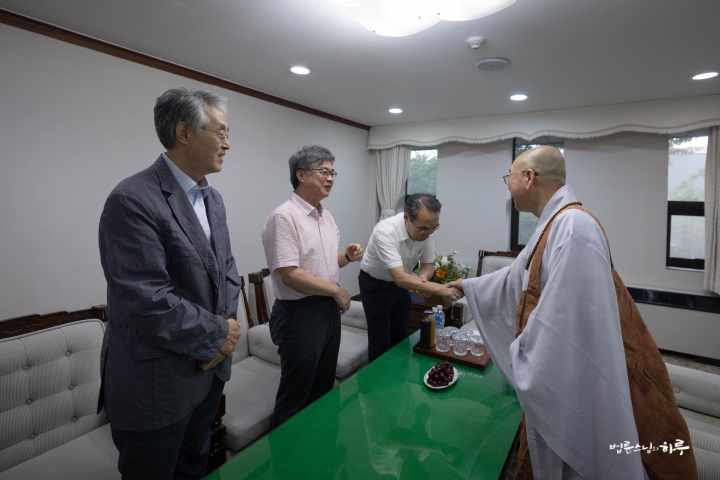
After exchanging warm greetings and having a brief conversation, they moved to the lecture hall together.
With over 900 citizens filling both the first and second floors of the KAIST auditorium, the lecture began energetically with actress Im Se-mi as the host.
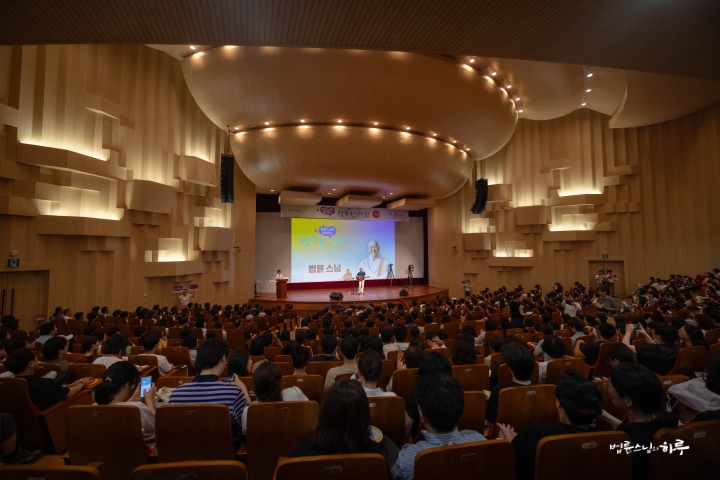
When Han Myung-hwan, a well-known singing instructor in Daejeon, enthusiastically sang “Delilah” and “My Love Like Starlight,” the audience quickly filled with excitement, erupting in applause and cheers.
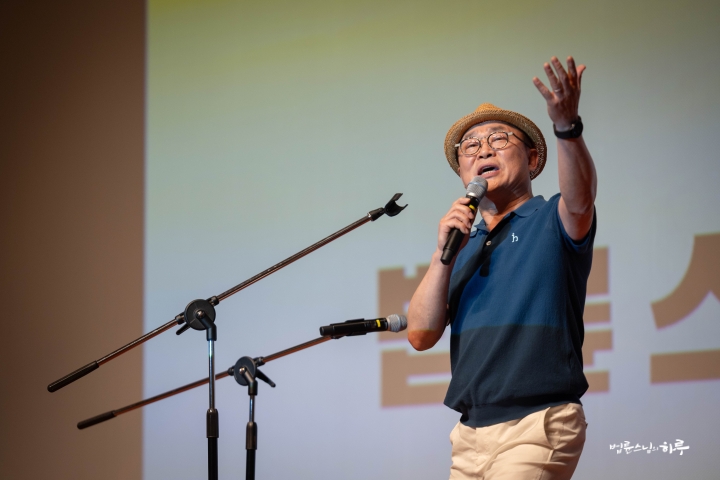
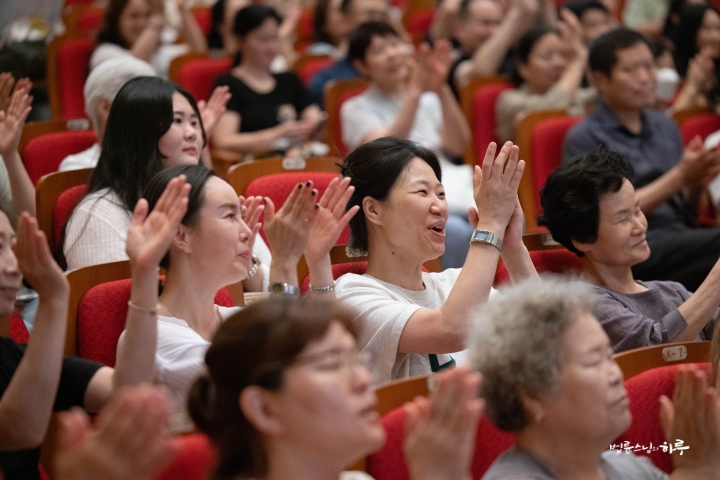
After watching an introductory video about Sunim, he walked onto the stage. Sunim asked for the audience’s understanding as he would be sitting during the lecture due to leg discomfort, then began the dialogue.
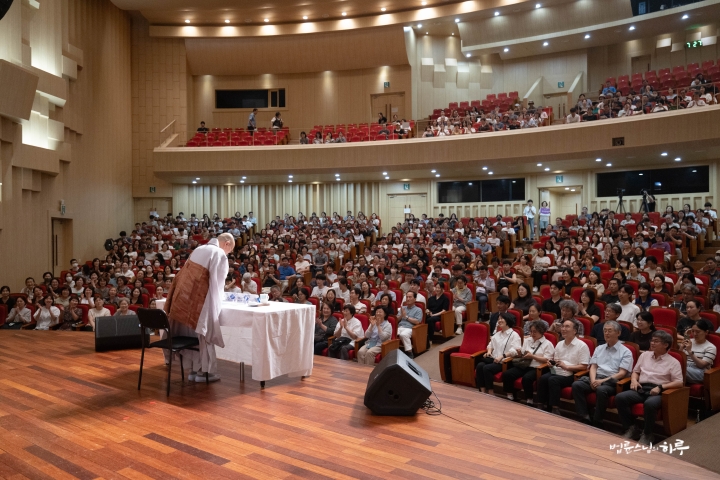
During the two-hour session, ten people raised their hands to ask questions and engage in dialogue with Sunim. One person shared that being considerate of others had become a habit since childhood, but recently felt like becoming an emotional dumping ground for others and feeling taken advantage of, seeking Sunim’s advice.
What Should I Do When I Feel Like an Emotional Dumping Ground for Others?
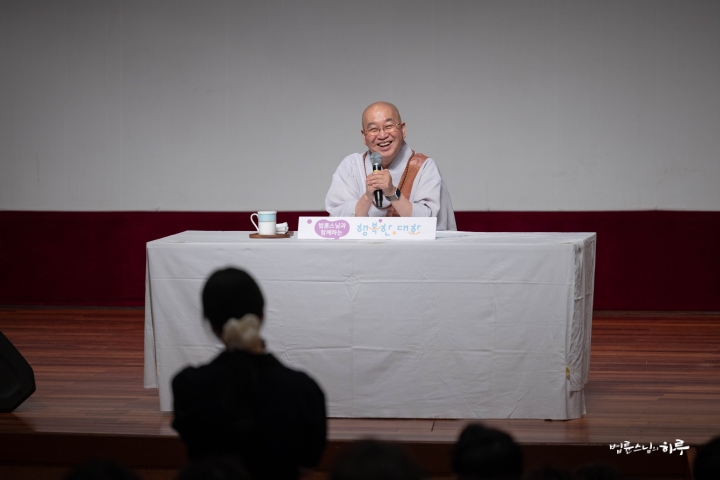
“You might think you’re being considerate of others, but from my perspective, you’re doing it because you want to be praised. People don’t give praise to just anyone. You have to buy them meals, clean for them, carry their bags to receive praise. The reason you listen to others’ problems, visit them first, and show consideration is ultimately because you want to be praised. If you no longer want to be praised, then from now on, you don’t have to go to such lengths.”
“I think you’re right, Sunim.”
“It’s all things you do because you want to. But ‘because you want to’ ultimately means ‘because you want to be praised.’ Conversely, it means ‘because you don’t want to be criticized.’ So if you’re prepared to be criticized, you don’t have to be so considerate or accommodating to others. If you’re prepared to take some criticism, you’ll become much freer.”
“Actually, I’m quite sensitive to criticism.”
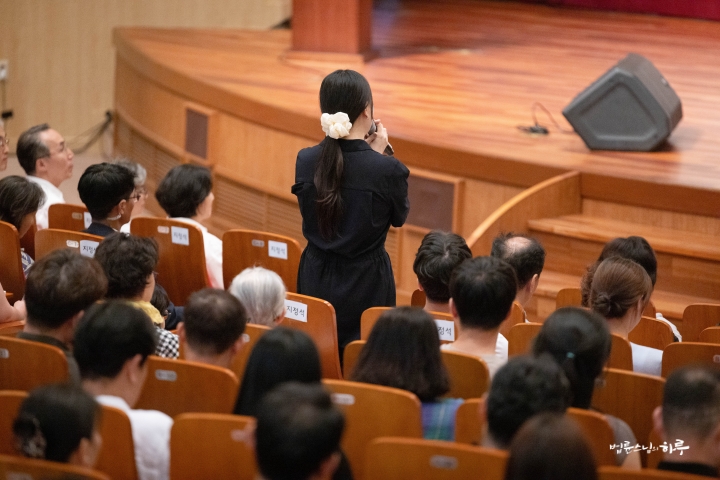
“That’s why you’re excessively considerate or accommodating to others. But that’s just one way of living. It’s nothing special. You think you’re considerate of others because you’re a kind person, but actually it’s because you don’t want to be criticized and want to be praised. So either continue living like this even if you feel taken advantage of, or live differently even if you get criticized – choose one of the two.”
“To make people like you, you have to do something for them – that’s how the world works. You have to buy meals, give rides, do something for people to like you. You shouldn’t think that others are selfish and only you’re losing out. You do it because you want to, because you want to be praised. When I entered the lecture hall just now, people applauded. Why do you think that was? If I charged a lot of money for Dharma Q&A, would they have applauded like that? Nobody would have applauded. Most of you feel more at ease after listening to my dharma talk, and since it doesn’t cost money, you like it. If I thought like you do, I received ten questions today, so I’ve become an emotional dumping ground for those ten people too. (laughter)” 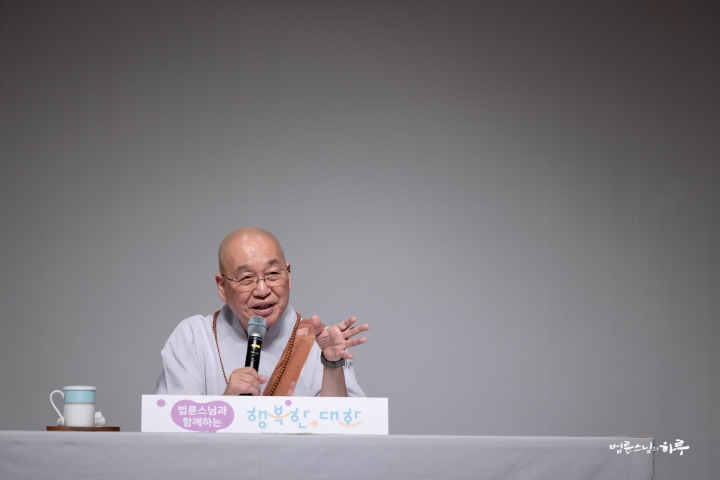
“If I am considerate, others will like and praise me, but if I act selfishly, others will dislike and criticize me. It’s up to you which choice to make. So you need to let go of the illusion that ‘I’m considerate because I’m a good person.’ You’ve been acting this way since childhood because you wanted to be praised. It’s nothing special. Even now, if you let go of the desire to be praised, you don’t necessarily need to be considerate first. Which is easier? Is it better to receive praise even if it means your body gets tired and you spend money? Or is it better to live accepting some criticism and blame? That’s for you to choose.”
“…”
“Why can’t you answer? For you, living with praise even if your body gets a bit tired has already become a habit. So just live the way you’ve been living. (Laughter) Don’t bother thinking about other alternatives. You’ve been living well so far, haven’t you? However, you don’t need to feel resentful looking at others and calling them ‘selfish.’ That’s something you did because you wanted to, because you wanted to be praised.”
“I understand. Thank you.”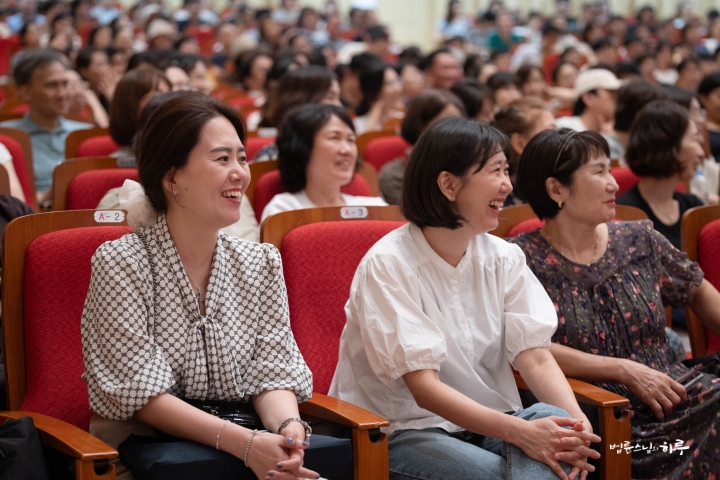
“Is it easier to do good things and receive praise? Or to do bad things and receive criticism? For me, doing good things and receiving praise is much easier. I’ve tried several times to do bad things and receive criticism, but it was really difficult. In that sense, I think some people are remarkable. By acting foolishly, they teach many people ‘I shouldn’t live like that.’ While doing bad things and receiving all kinds of criticism, they’re ultimately giving people great enlightenment. In Buddhism, we call such people ‘reverse-acting bodhisattvas’ (逆行菩薩). They serve as negative examples, helping us realize how not to live our lives. So there’s no need to hate such people. Rather, we should see them as remarkable people. (Laughter) 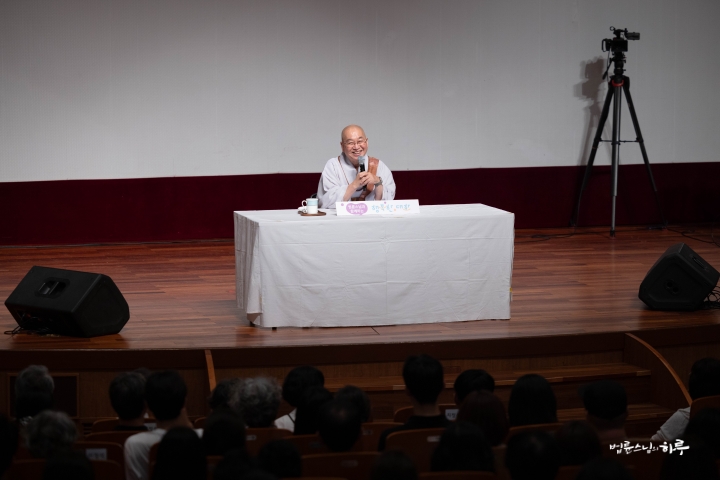
But you can’t be that kind of person. You’re only at the level of being a ‘forward-acting bodhisattva’ (順行菩薩), living a life of doing good things and receiving praise. I’m also at a low level, so I can only do this kind of work. I’ve decided to take the easy path of doing good things and receiving praise. People look at what I do and say ‘That must be hard,’ but actually, this is the easiest path. Living a life of doing bad things and receiving criticism is really difficult and not everyone can do it. So I hope you won’t follow others, but take the easy path of doing good things and receiving praise.”
“Yes, I understand well.”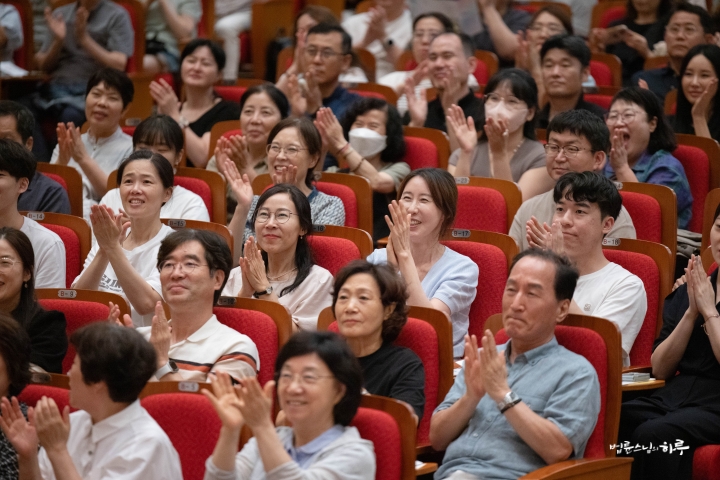
Questions continued one after another. Many KAIST students also attended and asked questions.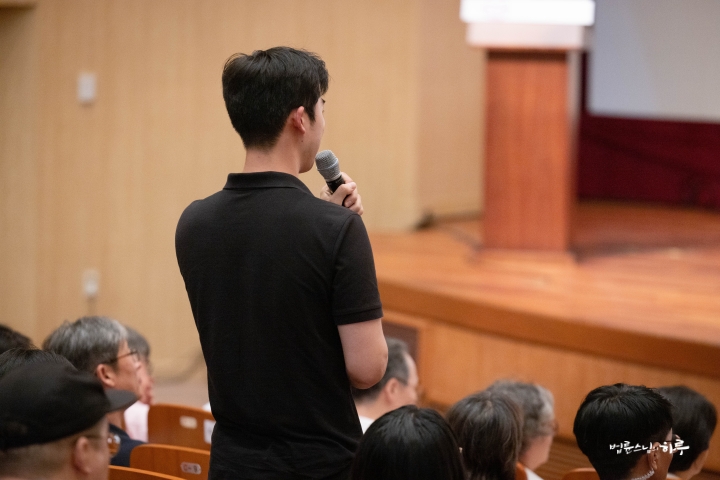
I experienced many difficulties due to conflicts with my advisor during my PhD program. What criteria should I use to judge people and build trust?
With the rapid development of AI technology, finding employment is becoming difficult. I’m afraid of becoming useless. How should I think about the future?
While researching life sciences, I conduct many experiments on mice. I feel guilty about accumulating karma from killing living beings. How should I accept the work I do?
Since middle school, I’ve had the intention to save lives, and even in university, I’m majoring in biotechnology and researching dementia. I have sufficient external motivation, but how can I develop internal motivation?
I’ve lived hearing that my heart is like glass because I easily reveal my inner thoughts. How can I become a strong person who doesn’t easily reveal my inner thoughts to others?
I’ve been receiving psychiatric treatment for 3 years and have improved a lot. Now I have a job and am married, and my situation has improved, but it’s still difficult. What should I do when I want to quit my company?
When I ask at one temple, they tell me to perform ancestral rites, and when I ask at another temple, they tell me to use the money for ancestral rites for sharing instead. Must ancestral rites be performed?
My son has been wandering since the third year of middle school and went to an alternative school, but these days he keeps pestering me to buy him a motorcycle. I sent him on a 3-month language study program, and he cries every day that it’s difficult. What should I do?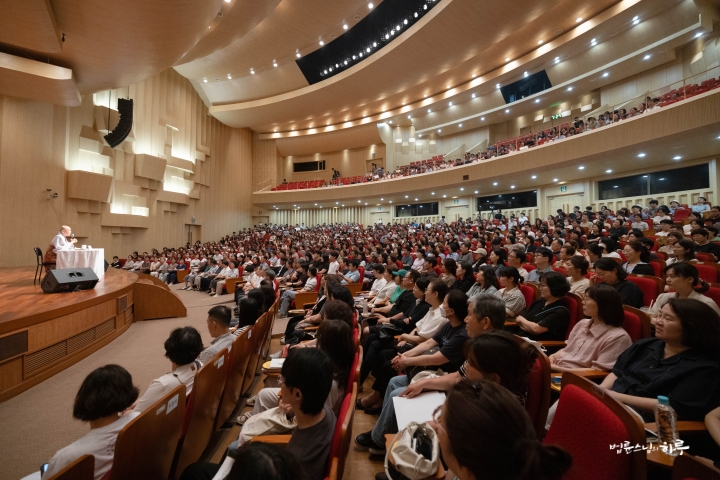
As the lecture was coming to an end, a young man raised his hand and asked a question. He said he was struggling with feelings of hatred toward people and asked Sunim for advice on how to manage his mind.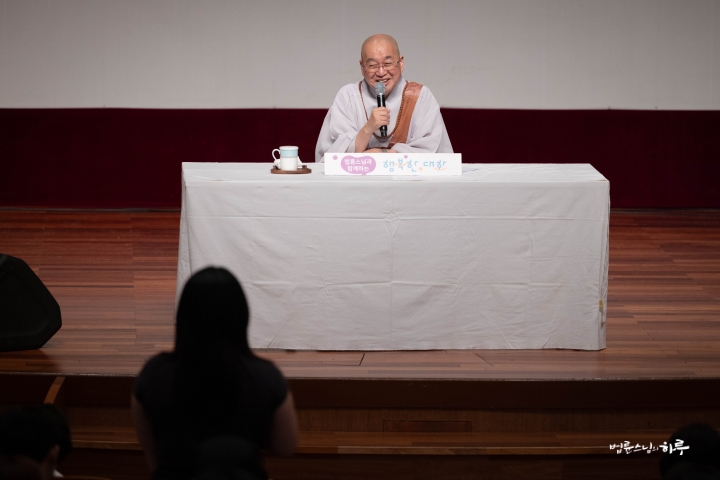
When Feelings of Hatred Toward People Keep Arising, What Should I Do?
“Whenever you feel dislike or hatred toward someone, say this to yourself: ‘Yeah, you’re so great.’ Keep repeating this phrase. Try saying it once: Yeah, you’re so great.”
“Yeah, you’re so great.” (Laughter)
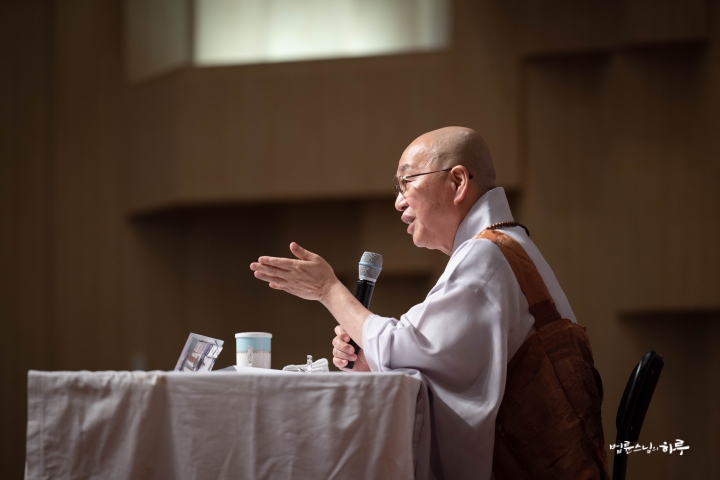
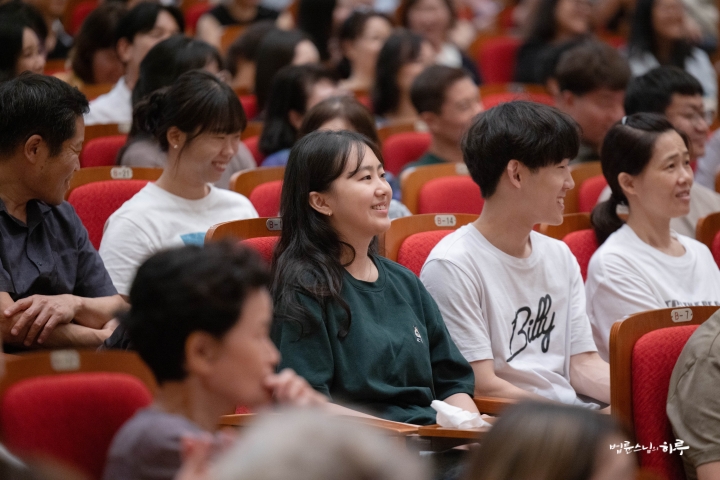
“Whenever you see others’ flaws and feel hatred, tell yourself ‘Yeah, you’re so great.’ In the Bible, there’s a passage that says ‘You see the speck in your brother’s eye but fail to see the beam in your own eye.’ It means we easily see others’ small faults while failing to see our own big faults. So don’t look at people too closely. If you look too closely at others, you’ll see even the specks in their eyes. Just look at them roughly. Whenever someone irritates you or you dislike them, warn yourself by saying ‘You’re showing off again.’ If you practice this way, you’ll gradually improve.”
“Yes, thank you.”
After finishing the dialogue, it was well past 9 PM.
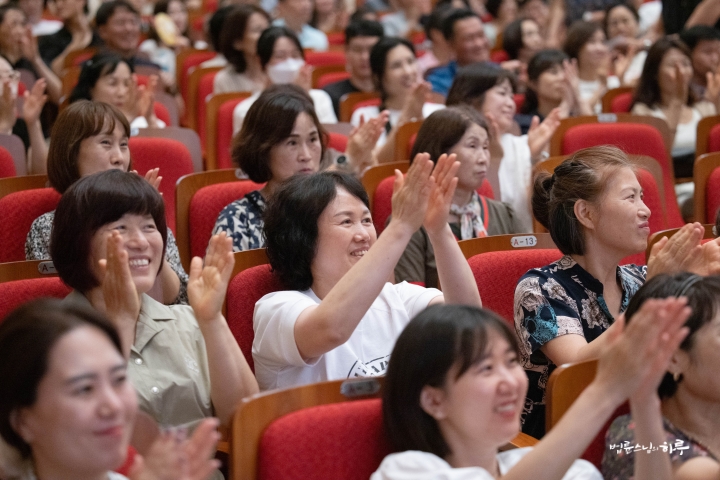
A book signing session was immediately held in the lobby outside the lecture hall. Many people brought Sunim’s books to get them signed.
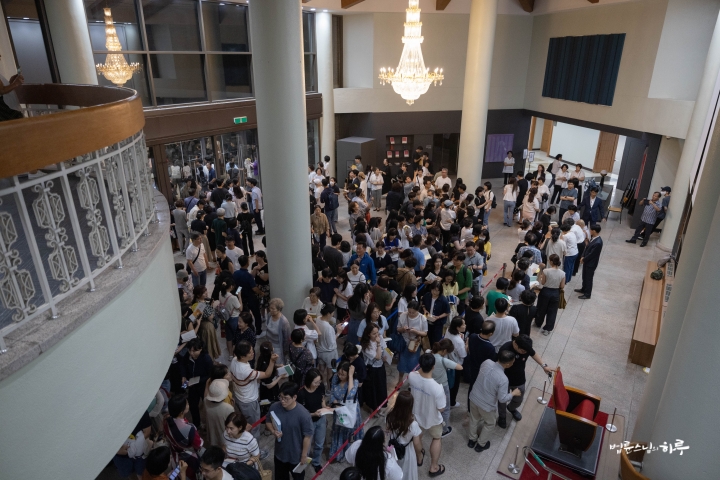
“Thanks to you, Sunim, many of my worries have been resolved. Thank you.”
Everyone expressed their gratitude to Sunim. Sunim made eye contact and exchanged greetings with each person. It took quite a while because there were so many people.
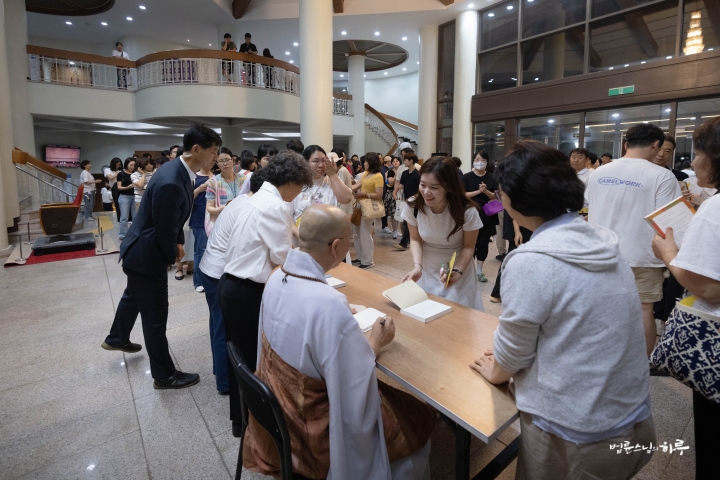
Finally, after taking a commemorative photo with the volunteers from the Daejeon-Chungcheong Branch of the Happiness Movement Special Headquarters who prepared today’s lecture, Sunim left the venue.
“Daejeon, fighting!”
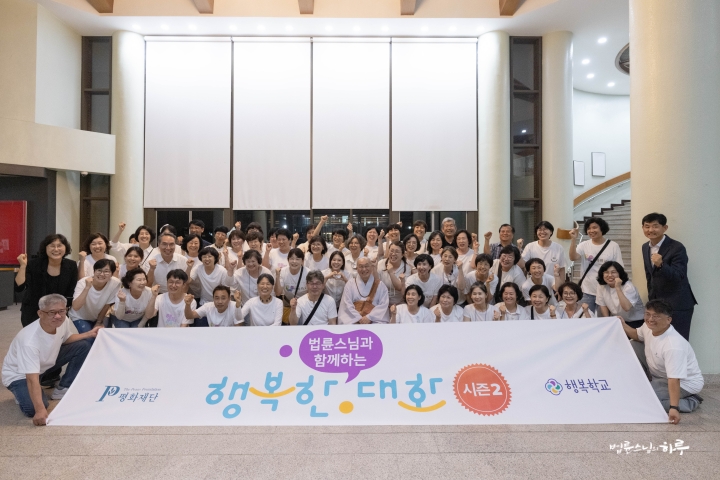
Departing from Daejeon at 9:40 PM, they headed to Seoul. After driving on the highway for an hour and a half, they arrived at Seoul Jungto Center after 11 PM and concluded the day’s activities.
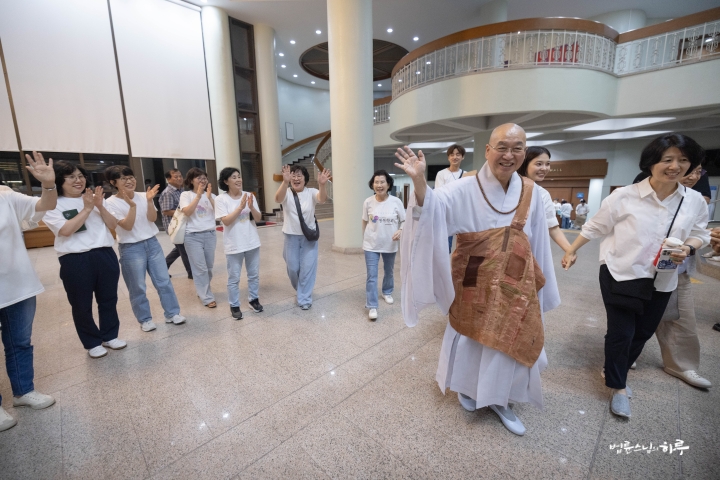

Tomorrow morning, Sunim will broadcast the Baekjung Prayer Opening Ceremony live from the Dharma Hall on the 3rd floor of Jungto Social and Cultural Center. In the afternoon, he will attend a seminar on “The Life of Our People and the Korean Language” with Professor Choi Han-sil, and in the evening, he will have a meeting with the planning committee members of The Peace Foundation.





